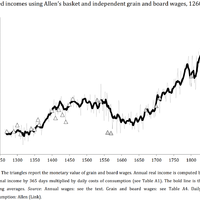Collection
Growth Collection
Collection of resources on "Growth" by Patrick Collison
"Across a broad range of case studies at various levels of (dis)aggregation, we find that ideas — and in particular the exponential growth they imply — are getting harder and harder to find."

After several centuries without measurable productivity growth, real wages seem to have started to grow circa 1640, 150 years before the Industrial Revolution. It's not clear why this happened. The nature of the phenomenon is also debated.


"As Cowen argues, our economy has enjoyed low-hanging fruit since the seventeenth century: free land, immigrant labor, and powerful new technologies. But during the last forty years, the low-hanging fruit started disappearing, and we started pretending it was still there. We have failed to recognize that we are at a technological plateau."
The deployment of electricity in manufacturing, and the greater efficiency it enabled, took decades to realize, as factories and processes had to be reorganized.

"This column analyses the diffusion of legal institutions that established Europe’s first large-scale experiments in mass public education. [...] Cities that formalised these institutions grew faster over the next 200 years, both by attracting and by producing more highly skilled residents."

"I argue that the crux was a “marriage of engineering culture and entrepreneurship.” That is, elites developed a new “engineering culture” that spread beliefs wholly different from those behind Renaissance, Medieval, or Classical approaches to knowledge and craft production." See also Mokyr, below.

"The Rise and Fall of American Growth challenges the view that economic growth will continue unabated, and demonstrates that the life-altering scale of innovations between 1870 and 1970 cannot be repeated."
"A review of Russell 1986's 'Like Engend'ring Like: Heredity and Animal Breeding in Early Modern England', describing development of selective breeding and discussing models of the psychology and sociology of innovation."

"Large differences in output per worker between rich and poor countries have been attributed, in no small part, to differences in Total Factor Productivity (TFP). The natural question then is: what are the underlying causes of these large TFP differences? [...] A recent paper by Restuccia and Rogerson (2008) takes a different approach. Instead of focusing on the efficiency of a representative firm, they suggest that misallocation of resources across firms can have important effects on aggregate TFP. Our goal in this paper is to provide quantitative evidence on the potential impact of resource misallocation on aggregate TFP. [...] We find that moving to “U.S. efficiency” would increase TFP by 30-50% in China and 40-60% in India."


"Using the unique dataset from Ravelry—the Facebook of knitters—I study why and how some knitters become designers. I show that knitters who make the entrepreneurial transition are distinctive in that they have experience in fewer techniques and more product categories. I also show that this transition is facilitated by participation in offline social networks where knitters garner feedback and encouragement."


